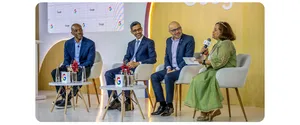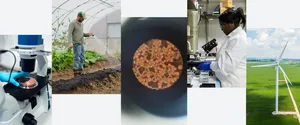Unlocking potential this Computer Science Education Week

I can still remember the computer science teacher who opened up a new world to me. Mr. Gilky started me on my path to a career in technology, and he even helped me get into summer programs to expose me to more computer science. His mentorship is why I’m so passionate about tech education today — and how I ended up leading outreach and education initiatives at Google.
Computer Science Education Week (CSEdWeek), which takes place from December 5-11, is an annual call to action for equity in computer science education. Although the numbers of Black, Latino, Native and female students taking Advanced Placement Computer Science (AP CS) exams have increased in recent years, still only 53% of U.S. high schools offer CS courses and historically marginalized groups continue to be underrepresented in CS education, professions and leadership .
We have a long way to go until all students receive the same opportunities in CS. That’s why this CSEdWeek, we’re both celebrating how far we’ve come, and we’re recommitting to the work ahead.
A decade of increasing access to CS education
This year marks the 10th anniversary of Hour of Code, a significant part of the movement to reduce the equity gap in CS education led by Code.org and powered by community contributions. Ten years ago is also when we launched Blockly, our free and open-source developer library for creating block-based visual programming languages and editors. Tens of millions of students have now learned to code on platforms and tools built on Blockly, like Scratch and Code.org’s widely used computer science curriculum.
It’s exciting to know that exploring computational thinking — a niche learning experience in my high-school years — is an opportunity millions of students can have this CSEdWeek. You don’t need to be a CS expert to participate: with lessons from CS First, it’s easy for parents, coaches, counselors, librarians and teachers of any subject to lead students in coding and problem solving.
No one organization can single-handedly give every student the opportunity to explore computer science, though. It’s only through the hard work of partners, educators and policymakers that progress has been made to reduce the CS education equity gap. We’re sharing some of the stories that illustrate the significant impact CS education has had on many individual lives.
The plans we have in motion
As part of our recent $20 million Grow with Google CS education commitment, we’re sharing this week how we’ve allocated more than $1.5 million to support students, educators and organizations across the country in major urban centers and rural communities. We’re focusing on addressing systemic inequalities to make sustainable changes and accelerate progress. Some examples are:
- Training and providing professional development in CS to teachers who serve underrepresented groups. In Mississippi, where all public schools will be offering computer science by the 2024-2025 school year, we will start supporting teachers with professional development sessions on CS First. In Chicago, our support will also provide tuition for teachers pursuing a Teaching Endorsement in Computer Science from University of Illinois Urbana-Champaign’s College of Education, in partnership with the Discovery Partners Institute. We’ll also provide professional development in CS First for elementary teachers in the Chicago Public Schools district.
- Developing culturally relevant and rigorous curricula for students of all ages. We’re partnering with Natives in Tech to revise and grow AI curricula to the tribal communities across the U.S., and, in Georgia, supporting the Center for Education Integrating Science, Mathematics, and Computing (CEISMC) at Georgia Institute of Technology in developing new student-centered AP CS Principles curriculum units and teacher support materials.
- Creating meaningful, lasting exposure through mentorship from professionals. All week, we’re hosting hundreds of coding and information sessions for students, mobilizing more than 2,000 Googlers to volunteer with schools or partner organizations in communities across the country. In rural South Dakota, in particular, we’re holding an Hour of Code event and a career panel with Indigenous individuals in tech for more than 1,200 Native students from the Rosebud Sioux tribe. We’re also helping fund an Urban TXT Hustle N’ Code Hackathon in Los Angeles, CA. The 150 students in attendance will have the opportunity to become proficient in HTML, CSS and Javascript with the support of volunteers from tech companies, universities and the community.
A future where every student receives access to CS education is within our reach – let’s work together to make it happen.







